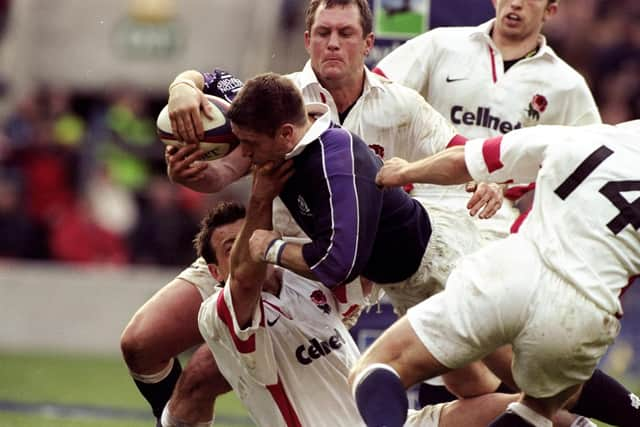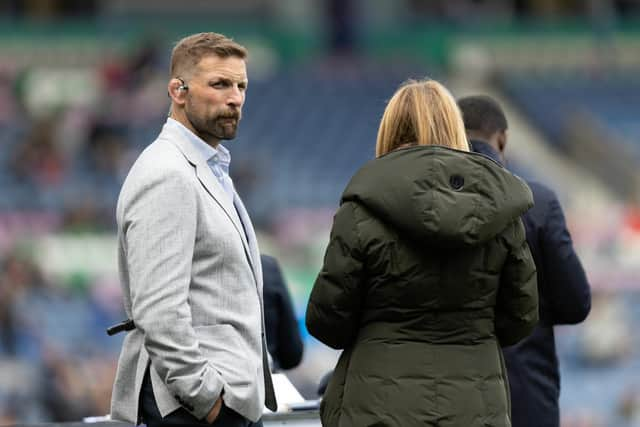Six Nations: Don't flutter eyelashes at pay TV - this is a crown jewel and must stay free-to-air
It’s the great, lost Scottish try. The finest to exist only in the memory. The best from a game played at Brigadoon RFC, destined to be re-shown once every hundred years (if you’re lucky). Actually, the venue was Twickenham and next year will be the try’s 25th anniversary. And even I’m beginning to wonder: did we even score it that day?
Did Alan Tait actually repel the first couple of Englishmen to approach by letting rip with a fierce Cumbrian accent, causing confusion? Then did he smash through three more, send them hurtling to the far corners like pub skittles?
Advertisement
Hide AdAdvertisement
Hide AdDid the RFU, panicking, dispatch a fleet of chariots onto the park, the lead drivers being Samantha Fox, Barbara Windsor and, right out in front, Twickers streaker Erika Roe, in the hope of distracting our man? And when four big lumps in all-white attached themselves to each of his limbs did Taity nonchalantly drag them over the line with him?


Stop me if you think I’m getting carried away but is it my fault if the try has become ever so slightly embellished in the memory? Whenever it’s time for the Calcutta Cup again, TV dusts down stirring scores from the past but never, I’m pretty certain, the one from 20 February, 1999.
Why? Well, that was a game broadcast on Sky which would seem to have rendered highlights unavailable to BBC and ITV who currently share the Six Nations. Won’t Sky release them? Are they too expensive? It was a stupendous try, after all. Seriously, maybe you think the disappearance of a single clip of Tait in his pomp is no big deal. It niggles me that I can’t see it unless I ferret around on YouTube but bigger worries affecting our enjoyment of the tournament lie ahead.
Last week, the government rejected calls for the Six Nations to be afforded so-called “crown jewels” status safeguarding it as free-to-air. It remains in a category of events vulnerable to pay-TV predators. Before this knockback the BBC had warned that when the current deal alongside ITV expires in 2025 the Corporation may no longer be able to afford the tournament and the commercial partner agreed that fears of it being lost to terrestrial are “well-founded”.
It was in 1998 that rugby first fluttered its eyelashes at pay-TV. Sky were allowed to pick and choose their games – they went for all of England’s, unsurprisingly - which made what was then the Five Nations frustratingly disjointed for armchair fans of all nations. Lacking expertise and much-loved voices (Bill McLaren, Eddie Butler), Sky's coverage was poor. Maybe they would do a better job now but the fundamental issue remains: if the Six Nations becomes something requiring monthly billing, not everyone will be able to watch.


Sky’s involvement ended in 2001. The Beeb-ITV share began in 2017 and perhaps there was some disquiet initially from traditionalists but generally the arrangement works well and ITV’s coverage, on their own, of the Rugby World Cup is classy. Nick Mullins is a first-rate commentator and the summarisers, all ear-crumpled ex-pros and among them the Scots John Barclay and Scott Hastings, provide expert demystification of the sport’s intricate rules.
This year’s RWC was the best yet and rugby might never have been in a stronger position to argue for promotion to the top category of protected events which also includes football’s World Cup, Wimbledon and the Olympics. Maybe England triumphing could have swung it but, having sneaked into the semi-finals, that didn’t happen.
At moments like these – the threat of the national broadcaster losing a showpiece sporting event after many years, and in that time having often done it proud – there is usually sympathy for the BBC. All the more so when, like now, they’re not just up against competitiors for rights but a government who interfere and don’t wholly value their work.
Advertisement
Hide AdAdvertisement
Hide AdAt any moment a Tory MP is bound to mention Gary Lineker. “Stop paying that man a small fortune and you’d have more to spend on the actual sport” will be the gist. And it’s true that the Beeb pleading poverty when that man earns £1.35 million a year can seem, well, a bit awkward.
I’ve nothing against Lineker. He does a good job on Match of the Day. But that’s a highlights show, admittedly for a more popular sport, and yet he’s the BBC’s highest-paid presenter – of anything. And yet £1.35 million isn’t quite enough, apparently. According to reports the Corporation are “preparing to open contract talks” with Lineker in a bid to “tie him down”. Even the average punter, not a Beeb-basher by any means, would assert that the contests down on the field are what’s really important and the rest is just window-dressing – and the average punter would have a point there.
This is the government’s position: “Our goal is to ensure events of national interest are free-to-air wherever possible, while protecting competition organisers’ ability to raise income from the sale of broadcast rights to invest in their sports.” In other words, they’ve handed the ball to the competition organisers and told them: pass or run, it’s up to you.
Rugby’s administrators, then, must decide whether this is a game which should be able to be watched by everyone, and so it can be grown that way – or available only to an exclusive audience which will pay for the privilege, the funds capable of being used to buy more crash-pads and cones.
Really, there’s only one choice. Let’s hope those entrusted with the sport’s wellbeing now and in the future get it right.
Comments
Want to join the conversation? Please or to comment on this article.